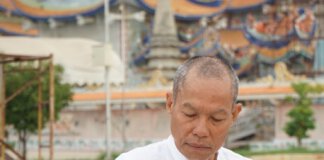วัยรุ่นยุคนี้ดูจะชอบวู่วามเน้อ จะพูด จะทำอะไร ชอบใช้แต่อารมณ์ และความรู้สึกล้วนๆ เลยนะน้องหนู
๕ มกราคม ๒๕๖๘
ขอบคุณนะที่ยังไม่ลืมกัน มีอะไรไม่ถูกใจ ไม่พอใจ ก็เขียน ก็โพสต์ด่ามาได้ตามสบายเลยนะจ๊ะ ถ้ามันจะทำให้คุณๆ ดูดี มีราคาขึ้น
ทีนี้มาดูหลักการและเหตุผลที่ผู้แสดงธรรมควรจะนั่งสูงกว่าผู้ฟังธรรม มันมิใช่เรื่องใหม่ใดๆ เลย
แม้เมื่อครั้งพุทธกาล ณ นครโกสัมพี พระนางสามาวดีพระมเหสีของพระเจ้าอุเทน พระนางต้องรู้สึกแปลกใจที่ทำไมวันนี้ห้องบรรทม และท้องพระโรงจึงเต็มไปด้วยดอกไม้สดที่งดงาม หอมอบอวลทั่วทั้งพระบรมมหาราชวัง ทั้งที่พระนางก็จ่ายเงินให้นางทาสีที่มีรูปร่างพิการ หลังคอม ขาเป๋ ชื่อขุชชุตตรา ให้ไปจัดซื้อดอกไม้มาประดับวังทุกวันๆ ละ ๘ กหาปณะ
เหตุการณ์เป็นเช่นนี้มาเป็นปี แต่ก็ไม่มีวันใดเลยที่จำนวนดอกไม้จะมากมายเห็นปานนี้
พระนางสามาวดีจึงเรียกนางขุชชุตตราทาสีมาถาม
นางขุชชุตตรา จึงได้ทูลว่า พระแม่เจ้า หม่อมฉันขอประทานอภัยที่ในอดีตผ่านมา หม่อมฉันเป็นคนไม่ซื่อตรง ได้ยักยอกเงินค่าดอกไม้ของพระองค์ไปวันละ ๔ กหาปณะ แต่มาวันนี้หม่อมฉันได้มีโอกาสฟังพระธรรมเทศนาที่องค์พระบรมศาสดาอรหันตสัมมาสัมพุทธเจ้าทรงแสดงแล้วบังเกิดธรรมสังเวช ธรรมปิติ มีดวงตาเห็นธรรม (บรรลุพระโสดาบัน)
หม่อมฉันจึงมีความละอาย ได้จัดซื้อดอกไม้จนครบตามจำนวนเงินที่พระแม่เจ้าได้พระราชทานมา จึงได้จำนวนดอกไม้มากมายเห็นปานนี้แหละเพคะ
อีกทั้งหม่อมฉัน ขอทูลถวายเงินที่ยักยอกไปทั้งหมดคืนแก่พระแม่เจ้าด้วยเพคะ
ข้างพระนางสามาวดีพระมเหสีขององค์ราชาอุเทน แทนที่จักโกรธนางทาสี กลับรู้สึกอัศจรรย์ใจว่า โอ้หน่อ พระธรรมขององค์พระผู้มีพระภาคเจ้าช่างเป็นที่น่าอัศจรรย์ยิ่งนัก สามารถทำให้ผู้สดับมีจิตใจและพฤติกรรมที่ซื่อตรงเช่นนี้ได้
พระนางสามาวดีจึงมิได้เอาความแก่นางขุชชุตตราทาสี แถมยังยกมือไหว้นางทาสีพร้อมอ้อนวอนให้นางขุชชุตตราทาสี ช่วยแสดงพระสัทธรรมที่ได้ฟังมาให้แก่พระนาง และข้าราชบริพารได้ฟัง
เมื่อนางขุชชุตตราทาสียินยอม พระนางสามาวดีจึงได้ให้เจ้าพนักงานพานางขุชชุตตราทาสีไปทำการอาบน้ำชำระขัดสีร่างกายพร้อมด้วยชโลมน้ำอบน้ำปรุง ดุจดังที่พระนางเคยใช้ทุกวัน แล้วจึงให้นุ่งห่มด้วยเครื่องทรงที่พระนางเคยทรงสวมใส่ ทั้งยังประดับตกแต่งร่างกายของนางทาสีด้วยเครื่องถนิมพิมพาภรณ์ อันโอฬาร์ ดุจดังที่พระนางประดับประดาตกแต่งพระวรกายในแต่ละวัน
ครั้งเสร็จแล้ว จึงเชิญนางขุชชุตตราทาสีขึ้นสู่พระแท่นตั่งที่ทรงประทับ ที่ปูลาดด้วยพระกัมพลอย่างดีถึง ๓ ชั้น
ส่วนพระนางสามาวดีพร้อมข้าราชบริพารก็ทรงนั่งประทับอยู่บนอาสนะที่ปูลาดบนพื้นบางๆ ชั้นเดียว แล้วทำการอภิวาทอาราธนาให้นางขุชชุตตราทาสีแสดงธรรม
พระนางสามาวดีกระทำกิริยานอบน้อมต่อนางทาสีผู้มีธรรมนี้ดุจดังพระมารดาของพระองค์เอง และเป็นอาจารย์ของข้าราชบริพารทั้งปวง
ด้วยสติปัญญาของนางขุชชุตตราทาสีสามารถแสดงธรรมที่สดับดับฟังมาจากพระโอษฐ์ขององค์พระบรมศาสดาเพียงครั้งเดียว ได้ครบถ้วนจนสามารถยังให้พระนางสามาวดีมีดวงตาเห็นธรรมพร้อมกับข้าราชบริพารทั้งปวง
กาลต่อมา พระบรมศาสดาทรงตั้งนางขุชชุตตราไว้ในตำแหน่งเป็นผู้เลิศในการแสดงธรรมฝ่ายคฤหัสถ์ อุบาสิกา
ที่หยิบยกเรื่องฆราวาสแสดงธรรมแล้วได้รับการยกย่องสูงสุดเช่นนี้ มาให้ศึกษาล้วนมีมาแล้วในครั้งพุทธกาล ด้วยหลักคิดที่ว่า ผู้แสดงธรรมไม่ว่าจะเป็นใคร ต้องอยู่สูงกว่าผู้ฟังธรรมเสมอ เพราะพระธรรมเป็น ๑ ในพระรัตนตรัย ที่อยู่เหนือกว่าสังฆรัตนะ
ยังจำได้ว่า สมัยเด็กๆ ตามแม่ไปฟังธรรมที่วัดมหาธาตุ สมัยที่ท่านเจ้าคุณโชดกยังมีชีวิตอยู่ ที่ศาลาวัดมหาธาตุอาจารย์แนบ มหานีรานนท์ ยังนั่งสูงกว่าพระลูกศิษย์
แม้แต่อาจารย์เสถียร โพธินันทะ ท่านสอนธรรมในศาลา พระเณรก็นั่งอยู่กับพื้นที่ปูลาดอาสนะ แต่ผู้สอนนั่งอยู่บนเก้าอี้ที่ตั้งอยู่บนฐานไม้ ที่ยกพื้นสูงกว่าพระเณรนั่ง
แต่ก็ไม่เห็นมีใครออกมาด่าว่า ไม่ดี
เพราะอะไรรู้มั้ย ?
ก็เพราะคนรุ่นฉันหรือก่อนฉัน เขาเรียนรู้ เขาศึกษา เข้าใจชัดว่า ผู้แสดงธรรมไม่ว่าจะแสดงแก่ใคร ก็ต้องอยู่สูงกว่าผู้ฟังธรรมทั้งนั้น
แต่แค่ในพระวินัยที่ว่าด้วยเสขิยวัตร ยังมีสิกขาบทที่ว่าด้วย ภิกษุห้ามอยู่สูงกว่าผู้แสดงธรรม
พระไตรปิฎก เล่มที่ ๒ พระวินัยปิฎก เล่มที่ ๒ มหาวิภังค์ ภาค ๒ เสขิยกัณฑ์ วรรคที่ ๗ ปาทุกาวรรค
ปาทุกาวรรค สิกขาบทที่ ๘ อันภิกษุนั่งอยู่บนพื้น ไม่พึงแสดงธรรมแก่คนไม่เป็นไข้ผู้นั่งอยู่บนอาสนะ ภิกษุใดอาศัยความไม่เอื้อเฟื้อ นั่งอยู่ที่พื้นดิน แสดงธรรมแก่คนไม่เป็นไข้ผู้นั่งอยู่บนอาสนะ ต้องอาบัติทุกกฏ.
ปาทุกาวรรค สิกขาบทที่ ๙ อันภิกษุผู้นั่งบนอาสนะต่ำ ไม่พึงแสดงธรรมแก่คนไม่เป็นไข้ผู้นั่งอยู่บนอาสนะสูง ภิกษุใดอาศัยความไม่เอื้อเฟื้อ นั่งบนอาสนะต่ำแสดงธรรมแก่คนไม่เป็นไข้ ผู้นั่งบนอาสนะสูง ต้องอาบัติทุกกฏ.
ปาทุกาวรรค สิกขาบทที่ ๑๐ อันภิกษุผู้ยืนอยู่ ไม่พึงแสดงธรรมแก่คนไม่เป็นไข้ผู้นั่งอยู่ ภิกษุใดอาศัยความไม่เอื้อเฟื้อ ยืนแสดงธรรมแก่คนไม่เป็นไข้ผู้นั่งอยู่ ต้องอาบัติทุกกฏ.
ขอบคุณ ขอบใจนะจ๊ะ ที่ยังห่วงใยกัน ติ เพื่อก่อ ถือว่าเป็นผู้ชี้ขุมทรัพย์
แต่ ติ เพื่อเสียดสี ประจาน เหยียดหยาม ถือว่า เป็นคนพาล
พุทธะอิสระ
——————————————–
อ่านย้อนหลัง : https://www.facebook.com/buddha.isara/posts/pfbid0CWYaMtRbSbmQqeei8Z32WZvJuUtHCrhmX3S8ZVdN59d8TVxqUvRiPCqfNtfPKCmTl
——————————————–
Teenagers these days seem to be impulsive. Whatever they say or do, they tend to use purely emotions and feelings.
January 5, 2025
Thank you for not forgetting me. If you dislike or feel unsatisfied with anything, feel free to post your criticism, given it makes you look better.
Now, let us examine the principles and reasons why the preacher should sit higher than the listener. This is not a new idea at all.
During the time of Buddha Gotama, in the city of Kosambī, Queen Sāmāvatī, King Udena’s wife, felt surprised that her bedroom and the audience hall were filled with beautiful, fragrant flowers. Each day, the queen gave a disabled, hunchbacked, limping maid named Khujjuttarā eight Karshapana (ancient Indian coins) to buy flowers to decorate the palace every day.
This had been like this for over a year, but there had never been many flowers.
Then, the queen asked Khujjuttarā why there were suddenly so many flowers.
Khujjuttarā said, “My Lady, I beg your pardon for what I have done in the past, that I was dishonest and stole four kahāpaṇas a day from your flower money. However, today, I had a chance to listen to the Buddha’s discourse. Listening with total attention, I attained the fruit of Stream-Entry (Sotāpanna). Therefore, I felt ashamed and bought flowers with all the money you gave me; that is why you see so many flowers.
Also, I would like to return all the embezzled money to you.”
Instead of being angry with the slave, Queen Sāmāvatī, the queen of King Udena, was amazed. Oh, how wonderful the Dharma of the Lord Buddha is! It has transformed listeners to have such an honest mind and behavior.
Queen Sāmāvatī did not punish Khujjuttarā. Instead, the queen bowed to Khujjuttarā and begged Khujjuttarā to teach her and her courtiers the Dhamma she had heard from the Buddha.
When Khujjuttarā agreed to do so, Queen Sāmāvatī then ordered her officials to take Khujjuttarā to bathe, cleanse, and polish her body with perfumed water. Khujjuttarā then wore the clothes and splendid ornaments of the queen.
The queen invited Khujjuttarā to sit on the throne, covered with three layers of the finest golden wool fabric.
Queen Sāmāvatī and her courtiers sat on a seat spread out on a single thin layer on the floor. They paid their respects and asked Khujjuttarā to teach them the Dhamma.
Queen Sāmāvatī treated this virtuous slave girl as if Khujjuttarā were her mother and the teacher of all her courtiers.
With the wisdom of Khujjuttarā, she could teach the Dharma she heard only once from the Buddha and made Queen Samawati and all of her courtiers established in the Fruition of Stream-Entry (Sotāpanna).
Later, the Buddha named Khujjuttarā the foremost among female lay disciples in learning and preaching the Dhamma.
I am telling you a story of laypeople preaching the Dhamma and receiving such high respect during the time of the Buddha. The principle is that the preacher, no matter who that person is, must always be higher than the listeners because the Dhamma, as one of the Triple Gems, is higher than the Sangha.
As a child, I followed my mother to listen to the Dhamma at the Mahathat Temple when Phra Chao Khun Chodok was still alive. At the hall of the temple, Ajahn Naep Mahaniranon sat higher than the monks who were her disciples.
Even when Ajahn Sathien Pothinantha taught Dhamma in the hall, monks and novices sat on the floor with a mat. The teacher sat on a chair on a wooden base, higher than monks and novices.
But no one criticized it.
Do you know why?
Because people of my generation and the elders learned, studied, and clearly understood that the one who preaches the Dhamma must always be higher than the one listening to the Dhamma.
The Vinaya concerning Sekhiya Vatthara states that a monk must not be higher than the one preaching the Dhamma.
Tripitaka, Volume 2, Vinaya Pitaka, Volume 2, Maha Vibhanga, Part 2, Sekhiya Khandhakas, Section 7, Paduka Vagga
Paduka Vagga, Rule 8: A monk, while sitting on the ground, shall not teach Dhamma to a person who is not sick sitting on a seat. Any monk who sits on the ground and preaches to a person who is not sick, sitting on a seat, is liable to ecclesiastical offense.
Paduka Vagga, Rule 9: A monk, while sitting on a low seat, shall not teach Dhamma to a person who is not sick sitting on a high seat. A monk who sits on a low seat and preaches to a person, who is not sick, sitting on a high seat, is liable to ecclesiastical offense.
Paduka Vagga, Rule 10: A monk, while standing shall not teach Dhamma to a person sitting who is not sick. A monk who stands to preach the Dhamma to a sitting person, who is not ill, is liable to ecclesiastical offense.
Thank you, thank you for your concern. Constructive criticism is considered a guide towards treasure. Nevertheless, a critic who ridicules, exposes, and humiliates others is a villain.
Buddha Isara
——————————————–
Previous article : https://www.facebook.com/buddha.isara/posts/pfbid0CWYaMtRbSbmQqeei8Z32WZvJuUtHCrhmX3S8ZVdN59d8TVxqUvRiPCqfNtfPKCmTl







